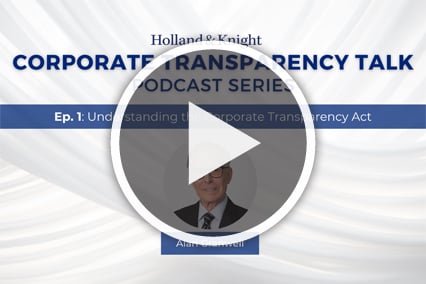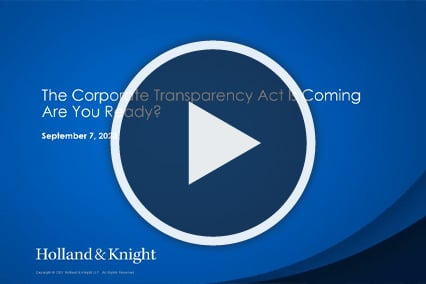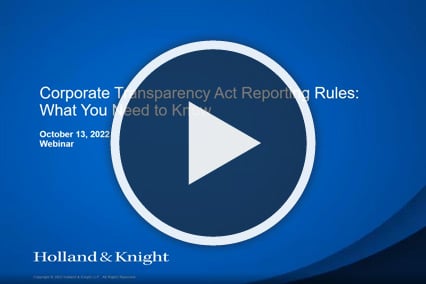Corporate Transparency Act
- The Corporate Transparency Act (CTA) entered into force on Jan. 1, 2024.
- This federal legislation requires Reporting Companies, i.e., certain domestic and foreign entities, such as corporations or limited liability companies (LLCs), to report information about individuals who are "Beneficial Owners" of the Reporting Companies to the federal government, which will be maintained in a national, non-public data base for use by governmental authorities.
- The CTA has introduced significant, new compliance burdens on Reporting Companies. Attorneys on Holland & Knight's Corporate Transparency Act Team can help you navigate this new law by advising on a Reporting Company's compliance obligations.

Overview
The Corporate Transparency Act, which entered into force on Jan. 1, 2024, requires "Reporting Companies" to report personal identifying information about the individuals who are "Beneficial Owners" and "Company Applicants" to the Financial Crimes Enforcement Network (FinCEN), a unit of the U.S. Department of the Treasury, which will maintain such information on a secure, non-public database for use by governmental authorities, certain financial institutions and financial regulators.
Holland & Knight has established a cross-disciplinary task force of veteran lawyers from multiple practice areas – corporate, private equity, venture capital, joint ventures, healthcare, financial services, real estate, white collar defense, private wealth and tax, among others – to counsel companies on programs for compliance with the CTA. Attorneys on Holland & Knight's CTA Team have closely followed the CTA since its enactment and are familiar with its requirements and ramifications. Below are answers to some basic questions regarding the CTA. Our lawyers stand ready to assist clients in determining the specific impact of the new law on their organizations and transactions, as well as actions to take to comply with the CTA.
Have There Been Legal Challenges?
On March 1, 2024, the U.S. District Court for the Northern District of Alabama entered a final declaratory judgment in National Small Business United v. Yellen, concluding that the Corporate Transparency Act exceeds the Constitution's limits on Congress' power. As a result, the government is not currently enforcing the CTA against the plaintiffs in that case. The U.S. Department of Justice, on behalf of the Treasury Department, filed a Notice of Appeal on March 11, 2024. Other than the particular individuals and entities subject to the court's injunction, reporting companies are still required to comply with the law and file beneficial ownership reports as provided in FinCEN's regulations.
Additional lawsuits challenging the constitutionality of the CTA have also been filed in various jurisdictions. Holland & Knight will continue to monitor these cases and their impact on client reporting obligations.
Why Was the CTA Enacted?
To combat the proliferation of anonymous shell companies used by illicit actors for criminal purposes in the U.S.
How Will My Company Be Impacted by the CTA?
Millions of legitimate companies and constituents will incur a new administrative burden to become informed and to comply on a continuing basis with the CTA's reporting regime.
What Is a Reporting Company?
- Domestic Reporting Company. A corporation, LLC or entity created by the filing of a document with a secretary of state or any similar office under the laws of a state or an Indian Tribe (including U.S. territories and possessions).
- Foreign Reporting Company. A corporation, LLC or entity formed under the laws of a foreign country that has registered to do business in the U.S. by the filing of a document with a secretary of state or equivalent office under the laws of a state or an Indian Tribe (including U.S. territories and possessions).
Which Entities Are Out of Scope?
Sole proprietorships, general partnerships, unincorporated associations, and common-law trusts are excluded because their creation does not involve filing a document with a secretary of state or similar office. So too, foreign entities that do not register to do business in a state or with an Indian Tribe likewise are excluded.
Which Entities Are Exempt from Reporting Requirements?
There are 23 entity exemptions, including:
- Public companies registered with the U.S. Securities and Exchange Commission (SEC), banks, insurance companies, broker-dealers, registered investment advisers, investment companies and pooled investment vehicles, tax-exempt entities and other highly regulated entities.
- "Large operating companies." Reporting Companies that directly 1) employ more than 20 full-time employees in the U.S., 2) maintain a U.S. operating presence at a physical office (owned or leased) in the U.S., and 3) have filed a federal income tax or information return with the U.S. Internal Revenue Service (IRS) for the previous year demonstrating more than $5 million in gross receipts from U.S. sources.
Comment: This exemption is available to privately held, for-profit entities, whether regulated or not. Tested entity must employ employees and maintain office, but gross receipts can be determined on a consolidated basis, if applicable. A company may fall within or without the exemption in different periods, depending on its gross receipts and/or number of employees; further, this exemption is unavailable to "startups" because these entities would not satisfy the tax return requirement in their year of organization. - Subsidiary Exemption. For the exemption to apply, one or more exempt entities must directly or indirectly, either wholly own all of the ownership interests of a subsidiary or wholly control all of the ownership interests of a subsidiary; however, subsidiaries of pooled investment vehicles and certain other entities are ineligible to use the Subsidiary Exemption.
Comment: This is a most useful exemption for lower-tier entities of an exempt entity.
Who Is a Beneficial Owner?
General Rule. An individual who, directly or indirectly, exercises "Substantial Control" over a Reporting Company or owns or controls at least 25 percent of the Ownership Interests of a Reporting Company.
|
Substantial Control Test Appointment or Removal Authority (of a Senior Officer or majority of Board of Directors). Important Decision-Maker over important decisions (e.g., business, finances, structure). Catch-All: Any other form of Substantial Control. Comments:
|
|
25 Percent Ownership Test Ownership Interest: equity, stock, voting rights, capital or profits interests, convertible instrument, options and other ownership mechanisms. Ownership or Control of Ownership Interest: Any contract, arrangement, understanding, relationship or otherwise, such as through direct or indirect ownership, debt, joint ownership, nominee, trust, or owning or controlling intermediate entity that owns/controls Reporting Company. Calculation: Determine whether an individual directly or indirectly owns or controls 25 percent of the ownership interest (by reference to voting power, value, capital and profits interests or, if foregoing calculations cannot be performed with certainty, an individual is deemed to hold 25 percent ownership/control provided the individual owns/controls 25 percent or more of any class of ownership interest). |
Exceptions from Beneficial Owner Definition. 1) Minor child, 2) nominee, intermediary, custodian, agent, 3) employee (other than Senior Officer), 4) inheritor (future interest through a right of inheritance), and 5) creditor.
Who Is a Company Applicant?
- Definition. A Company Applicant is an individual involved with the formation or registration of a Reporting Company.
- Category 1: The individual who directly filed the document that created a Domestic Reporting Company or that first registered a Foreign Reporting Company with a secretary of state or similar office.
- Category 2: The individual who was primarily responsible for directing or controlling the filing of the creation or registration document, provided more than one individual was involved in the filing. Consider who makes decisions on the filing of the document, such as the document’s content, how it is managed and when and where the filing occurs.
- Comment: A Reporting Company formed on or after Jan. 1, 2024 (but not before), is required to report at least one Company Applicant, and at most two.
What Are the Reporting Obligations of a Reporting Company to FinCEN?
Initial Report
|
Reporting Company Created/Registered Provide information about:
|
|
Reporting Company Created/Registered Provide information about:
|
Initial Report Information Items for Reporting Company, Beneficial Owner and Company Applicant
- Reporting Company. Full legal name, trade name or doing business as (DBA), current address (principal place of business in U.S., or primary U.S. location if the company's principal place of business is not in the U.S.), jurisdiction of formation and, for a foreign company, state/Tribal jurisdiction of first registration, tax ID number or, for a foreign company, foreign tax ID (if no U.S. ID).
- Beneficial Owner. Full legal name, date of birth, residential address, unique ID number and issuing jurisdiction, and an image of one of the following nonexpired documents: U.S. passport, state driver's license, or ID issued by a state or local government or an Indian Tribe; if a foreign individual does not have any of the foregoing, then a foreign passport. (No other forms of ID are permissible.)
- Company Applicant. Same information as for a Beneficial Owner, but use individual’s business address for an individual who forms/registers a company in the course of business.
- FinCEN Identifier. A unique ID number issued by FinCEN to an individual upon request, which is used by a Reporting Company in lieu of a Beneficial Owner's or Company Applicant's personal identifiable information (PII); individuals with FinCEN Identifiers are required to update FinCEN of any change in PII within 30 calendar days after a change occurs.
Due Date
|
Reporting Company Formed/Registered |
Not later than Jan. 1, 2025. |
|
Reporting Company Formed/Registered |
Within 90 days of the earlier of 1) actual notice of creation/registration or 2) public notice of creation/registration. |
|
Reporting Company Formed/Registered |
Within 30 days of the earlier of 1) actual notice of creation/registration or 2) public notice of creation/ registration. |
Updated Report. Within 30 calendar days after a change of previously reported information for Reporting Company or Beneficial Owner occurs.
Corrected Report. Within 30 calendar days after Reporting Company became aware or has reason to know of any inaccuracy.
Where to Send. File electronically with FinCEN on their secure filing system. See FinCEN's Beneficial Ownership Information website.
Are There Penalties for Noncompliance?
Yes. Both civil and criminal penalties for 1) the willful failure to report, 2) the willful failure to update beneficial ownership information and 3) willful failure to correct inaccurate beneficial ownership information.
- Civil Penalties: $500 per day in civil monetary penalties (no maximum amount).
- Criminal Penalties. $10,000 fine, imprisonment for no more than two years, or both.
- Comment: Penalties may apply to Reporting Company, as well as to an individual who caused a failure to correctly, timely and properly report or was a Senior Officer at the time of a failure.
Next Steps
Please reach out to our team or your Holland & Knight contact if you have questions about the CTA. Although Holland & Knight will not prepare or file reports with FinCEN or monitor your business or activity to determine the need for updated or corrected reports, we can provide referrals for third-party vendors who can assist with data collection/retention/alerts and report filings with FinCEN. Holland & Knight will provide advice related to CTA compliance only when explicitly requested to do so.















